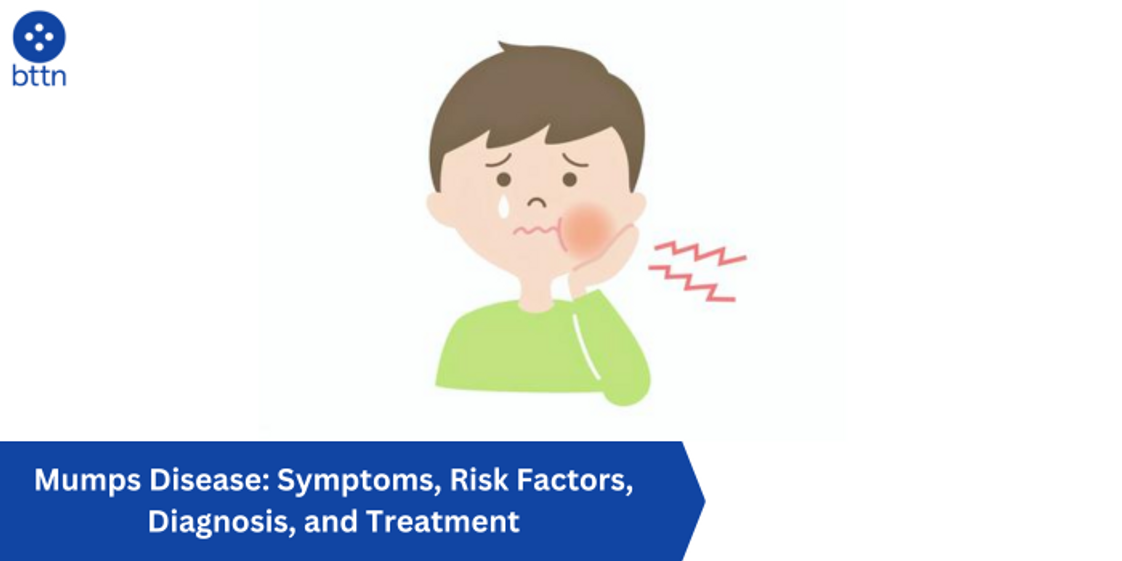
Mumps Disease: Symptoms, Risk Factors, Diagnosis, and Treatment
Posted by Pankaj Dhiman on Mar 18th 2024
Mumps disease, though less prevalent in modern times due to widespread vaccination, remains a concern due to potential complications. Understanding its symptoms, risk factors, diagnosis, treatment, and prevention measures is vital for public health awareness.
Introduction to Mumps Disease
Mumps, caused by the mumps virus, primarily affects the salivary glands, resulting in painful swelling. While the incidence has decreased significantly since the introduction of the MMR (measles, mumps, and rubella) vaccine, outbreaks still occur, emphasizing the importance of continued vigilance.
What is Mumps Disease?
Mumps is a highly contagious viral infection characterized by swollen salivary glands, particularly the parotid glands located below the ears. The virus spreads through respiratory droplets or direct contact with an infected person's saliva.
Before the introduction of the mumps vaccine, the disease was a common childhood illness. However, widespread vaccination has led to a substantial decline in cases, demonstrating the effectiveness of immunization programs.
Mumps Disease Symptoms
Common Signs and Symptoms
Symptoms typically manifest 12-25 days after exposure to the virus. Initial signs include fever, headache, muscle aches, fatigue, and loss of appetite. Swelling of one or both parotid glands follows, causing pain and tenderness in the affected area.
Severity and Duration
While most cases resolve within a few weeks without complications, some individuals may experience severe symptoms or develop complications such as meningitis or deafness.
Risk Factors for Mumps Disease
Factors Contributing to Infection
Unvaccinated individuals or those with incomplete vaccination are at higher risk of contracting mumps. Additionally, close contact with infected persons in crowded environments increases the likelihood of transmission.
Vulnerable Populations
Children, especially those aged 5-9 years, are most susceptible to mumps due to their developing immune systems. However, outbreaks can occur in any age group, particularly among adolescents and young adults in communal settings like colleges or military barracks.
Diagnosis of Mumps Disease
Diagnostic Methods
Diagnosis is primarily based on clinical symptoms, including characteristic gland swelling and recent exposure to the virus. Laboratory tests, such as viral culture or polymerase chain reaction (PCR), may confirm the diagnosis by detecting the mumps virus in saliva or blood samples.
Differential Diagnosis
Mumps symptoms may resemble those of other conditions, such as bacterial parotitis or lymphadenitis. Differential diagnosis is essential to rule out other possible causes of glandular swelling.
Treatment Options for Mumps Disease
Medical Interventions
Currently, no specific antiviral therapy exists for mumps. Treatment focuses on relieving symptoms, such as pain and fever, through rest, hydration, and over-the-counter pain relievers. In severe cases or those with complications, hospitalization may be necessary for supportive care.
Home Remedies and Care
Home remedies such as applying warm or cold packs to swollen glands, eating soft foods, and staying hydrated can help alleviate discomfort. Rest and isolation from others are crucial to prevent spreading the virus to uninfected individuals.
Recovery and Aftercare
Healing Process
Most individuals recover from mumps within two weeks, with symptoms gradually subsiding as the immune system clears the virus. Adequate rest and self-care practices facilitate a smooth recovery.
Post-Mumps Care Tips
After recovering from mumps, it's essential to resume regular activities gradually and maintain good hygiene practices to prevent secondary infections. Follow-up appointments with healthcare providers may be necessary to monitor for complications.
Complications Associated with Mumps Disease
Potential Health Risks
While mumps complications are rare, they can be severe, particularly in adults. Complications may include orchitis (testicular inflammation), meningitis, encephalitis, pancreatitis, and deafness.
Long-term Effects
In some cases, mumps can lead to permanent complications, such as hearing loss or infertility due to orchitis. Timely diagnosis and appropriate medical care help mitigate the risk of long-term sequelae.
Prevention Strategies
Vaccination Importance
Vaccination with the MMR vaccine is the most effective way to prevent mumps and its complications. The CDC recommends two doses of the vaccine for optimal immunity, with the first dose administered at 12-15 months of age and the second dose at 4-6 years.
Hygiene Practices
Practicing good hygiene, including frequent handwashing and avoiding close contact with sick individuals, helps reduce the spread of mumps and other infectious diseases. Covering coughs and sneezes and disinfecting frequently touched surfaces are essential preventive measures.
Can Mumps be Contracted Twice?
Immunity Considerations
Most people who recover from mumps develop lifelong immunity to the virus. However, rare cases of reinfection or breakthrough mumps in vaccinated individuals have been reported, highlighting the importance of ongoing surveillance and research.
Recurrence Possibilities
While reinfection is uncommon, individuals with weakened immune systems or those exposed to high viral loads may be at higher risk. Continued vaccination efforts and public health initiatives aim to minimize the likelihood of mumps resurgence.
Final Thoughts on Mumps Disease
Despite advances in vaccination and disease control, mumps remains a concern, particularly in unvaccinated or under-vaccinated populations. Public awareness, timely vaccination, and adherence to preventive measures are crucial for reducing mumps incidence and protecting vulnerable individuals.
FAQs
- Is mumps contagious before symptoms appear?
- Yes, individuals infected with the mumps virus can spread it to others several days before experiencing symptoms.
- Can adults get mumps if they were vaccinated as children?
- While rare, breakthrough mumps infections can occur in vaccinated individuals, especially in settings with close contact or high disease prevalence.
- Are there any long-term complications of mumps in children?
- While most children recover fully from mumps without complications, rare cases of long-term effects such as deafness or infertility due to orchitis have been reported.
- How effective is the mumps vaccine?
- The MMR vaccine is highly effective, with two doses providing approximately 88% protection against mumps infection.
- What should I do if I suspect I have mumps?
- If you experience symptoms suggestive of mumps, such as swollen glands and fever, contact your healthcare provider for evaluation and guidance on appropriate care.
In conclusion, mumps disease, although preventable through vaccination, continues to pose risks to public health. Understanding its symptoms, risk factors, diagnosis, and treatment is essential for effective management and prevention. By promoting vaccination and practicing good hygiene, we can mitigate the impact of mumps and safeguard community health.





























































